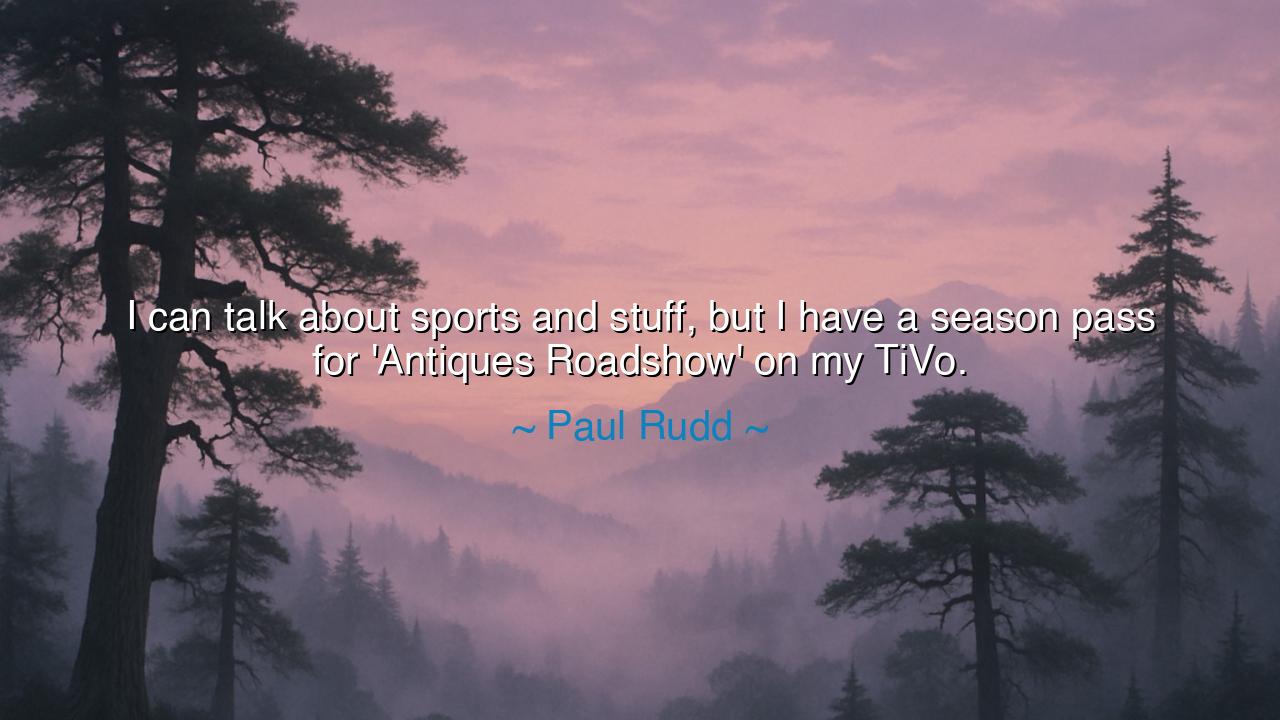
I can talk about sports and stuff, but I have a season pass for
I can talk about sports and stuff, but I have a season pass for 'Antiques Roadshow' on my TiVo.






The words of Paul Rudd bring a gentle smile, yet within them lies a deeper lesson: “I can talk about sports and stuff, but I have a season pass for ‘Antiques Roadshow’ on my TiVo.” At first glance, it seems merely playful, a lighthearted confession of personal taste. Yet, like many truths wrapped in humor, it reveals something profound about the nature of authenticity, about the courage to delight in what brings joy, rather than what the crowd demands. In this balance of the common and the uncommon, we find the path to individuality.
For sports—those contests of speed, strength, and glory—have long been the language of the masses. They unite cities, nations, and tribes, igniting the passions of multitudes. To speak of them is to find easy fellowship, to walk upon the familiar road of conversation. Yet Rudd does not stop there; he proclaims his devotion to the Antiques Roadshow, a quieter pursuit, a world not of battle but of history, memory, and hidden worth. In this juxtaposition, we see the dance of conformity and individuality: one hand extended to common ground, the other firmly holding to the soul’s peculiar treasures.
Consider the meaning of the Antiques Roadshow itself. It is not merely a program of appraisals, but a mirror held up to human life. An old chair, a weathered painting, a forgotten heirloom—all become vessels of story, reminders that what seems ordinary may conceal priceless worth. To delight in such things is to delight in the mystery of the past, to recognize that value lies not always in the shining new, but in the humble object carried through time. By choosing this, Rudd reveals that joy is found not in what is fashionable, but in what speaks to the heart.
History offers us parallels. The Roman philosopher Cicero, though skilled in politics and rhetoric, confessed a deep love for reading scrolls on obscure topics, even as others around him preferred the spectacles of the Circus Maximus. He found in the dusty scrolls a peace that the roar of the arena could not provide. Like Rudd, he straddled two worlds: conversant in the common tongue of the people, yet nourished by the subtler food of the spirit. Thus we see that authenticity is not born of rejecting the popular, but of balancing it with the personal.
There is also a lesson in humility here. By admitting his love for something as unglamorous as antiques, Rudd confesses vulnerability. He does not mask his quirks, nor shape himself into an image of what is expected. This is a great wisdom: that true strength lies not in conforming to the ideals of others, but in embracing one’s authentic delights. To pretend interest only in what is grand or widely adored is to live half a life. To reveal one’s unusual passions is to live fully, openly, without fear of ridicule.
The practical lesson, then, is this: do not be ashamed of your unique joys. Speak the common tongue when needed, yes—discuss the games, share the weather, walk upon the paths where many tread. But also guard and celebrate the pursuits that set your spirit alight, however small, however peculiar. These are the ornaments of the soul, the treasures that make you distinct in the great throng of humanity. In them lies not weakness, but strength.
Therefore, children of the future, take heed. The world will always beckon you toward the popular, the loud, the celebrated. But it is the quiet loves, the odd passions, the “season passes” of your life that reveal who you truly are. Embrace them. For it is not in the endless roar of the crowd that your soul will find rest, but in the cozy, unexpected places where your heart feels at home.
Thus Paul Rudd’s jest becomes an enduring teaching: do not be afraid to speak the language of the many, but never forget to cherish the song of the few. In this harmony of conformity and individuality lies the secret to a life both connected and authentic—a life where joy is genuine, and the spirit remains free.






AAdministratorAdministrator
Welcome, honored guests. Please leave a comment, we will respond soon